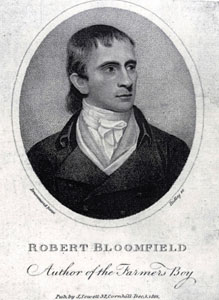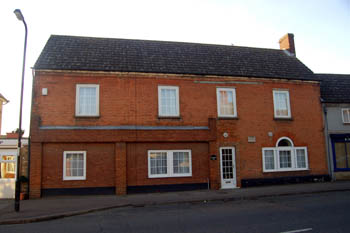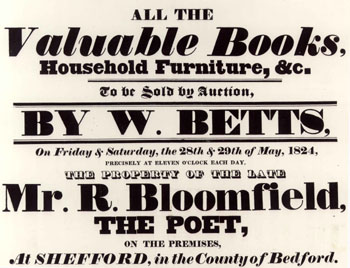
Robert Bloomfield was born in 1766 at Honington in Suffolk. He did not come from a wealthy background and matters were made worse by the fact that his father died when he was only a year old. Fortunately for him his mother was an educated woman, she kept the village school, and so was able to teach him to read and write.
When he was eleven he became apprentice to a farmer but he was too small and frail for the rigours of farm work, so at the age of fifteen he moved to London, apprenticed to a poor shoemaker. He wrote The Farmer's Boy in a crowded attic in Bell Alley, London, memorising it until he could write it down; it was published in 1800 and made his name. He published four collections of poetry in his easy, unchallenging style - Rural Tales in 1802, News from the Farm in 1804, Wild Flowers in 1806 and The Banks of the Wye in 1811.
It was in 1812 that things went wrong again for him. Price were rising on account of the Napoleonic Wars and two of his publishers went bankrupt, one after the other, meaning that he lost £500, a very considerable sum in those days. He thus decided to move from London, for his health and to lessen his overheads. His apparently odd choice was no move, not back to Suffolk, but to Shefford, hiring a, not insubstantial, house in Northbridge Street (see below) for £15 per annum. Probably the main reason he did not return to Suffolk was to avoid importuning relatives, his brothers, in particular, being wont to tap him for cash; he wrote of his native place: "Honington I have done with and it seems effectually to have done with me". He probably moved to Shefford because two of his friends lived there - Thomas Weston, a draper in the town and Thomas Inskip. Bloomfield's description of his house in Shefford in 1812 seems quite far removed from the middle of the town today: "…every charm of Spring surrounds us…a robin is building in the meadow behind, the nightingale is heard even to the doors, the cuckoo plies his two notes all day, and a colony of frogs their one by twilight".

Bloomfield House in Northbridge Street, February 2008
The Man in the Moon was written shortly after arriving in Shefford
The man in the moon looked down one night
Where a lad and his lass were walking;
Thinks he there must be very huge delight
In this kissing and nonsense-talking:
And so there must ('tis a well known case),
For it lasts both late and early.
So they talked him down, till he cover'd his face,
- They tired his patience fairly.
Then up rose the Sun in his morning beams
And push'd back his nightcap to greet them.
Says he, - "As you boast of your darts and flames,
My darts and my flames shall meet them".
He scorch'd them both through the livelong day,
But they never once seem'd to mind him
But laughed outright, as he skulk'd away,
And left a dark world behind him.
Then the man in the moon look'd down in a pet,
And said, "I believe I can cure you;
Though my brother has fail'd I may conquer yet -
If not I must try to endure you.
"Go home," he cried, "and attend to my rules,
And banish all thought of sorrow;
Then jump into bed you couple of fools,
And you'll both be wiser tomorrow".
He published no more books of verse after moving to Shefford though he did write the odd poem like The Man in the Moon, published after his death. His daughter Mary Anne died in 1814, aged just twenty one. In 1815 he published a rather bland little children's story called the History of Little Davy's New Hat, followed by the equally unmemorable The History of the Chicken and the Horse and the History of the Boy and the Wasp in 1818. By this time his mental health, never very good, was waning and his physical health matching it, becoming almost blind. He also suffered by his wife's ill-considered spending. He wrote a short play, Hazelwood Hall, published shortly before his death which came at his house in Northbridge Street on 19th August 1823, aged 56. He was buried in Campton churchyard.

sale poster of Robert Bloomfield's effects
Shortly after his death Bloomfield's possessions were auctioned at his house. The sale ran over two days:
"THE FIRST DAY'S SALE will consist principally of Books, which have been presented to Mr.BLOOMFIELD (as Tokens of Firendship and Esteem) by the first Characters of the Age, and will also comprise the Original Manuscripts of The Farmer's Boy, Rural Tales, Wild Flowers, Banks of the Wye and may-Day with the Muses, in the Author's own Handwriting.
THE SECOND DAY'S SALE will consist of mahogany Dining, pillar-and-claw Tables; Feather-beds; Bolsters and Pillows; Blankets; Wool Mattresses; Tent Bedsteads; Chest of Drawers; Dressing Table; Chamber Chairs; Night Commode; Mahogany Chairs; Harpsichord; portable Writing Desk; handsome modern mahogany Escritoir, fitted up in a superior style with internal Drawers and Bookcase on ditto, with gothic glazed Doors (fine wood); Pier and Dressing Glasses; new-improved Terrestrial Globe; Pocket ditto; modern Time-piece in a mahogany case; Bronze Cast of BUONAPARTE in a glass cover; Brussels Carpet; Telescope; very good Microscope (complete), by Banks, London; Hawkins' patent Writing Machine; very beautiful INKSTAND (presented to Mr.R.Bloomfield by the celebrated Dr.Jenner); Kitchen Range; Bath Stoves; large brewing Copper; washing ditto; wine Barrels; vertical Jack; Kitchen Requisites; Carpenter's Bench; quantity of Carpenter's Tools. And amongst the Articles of Furniture, the celebrated OAK TABLE will be included, which Mr.Bloomfield may be said to have rendered immortal by the beautiful and pathetic Poem inscribed to it in his Wild Flowers.
* As it is presumed that many Admirers of the Poetry of Mr.Bloomfieldmay wish to possess some Relic of this celebrated Author, the Auctioneer therefore respectfully assures the Public, that every Article offered for Sale has been the Property of Mr.Bloomfield; and those Articles which are so described, were presented to him (as Tokens of Friendship and Esteem) by the Persons whose Names are affixed in the Catalogue.
Every Purchaser of Booksto the Amount of £1 will be presented with a beautiful Copper-plate Engraving of Mr.BLOOMFIELD, Portrait by Rising; sold originally at 15s. each".